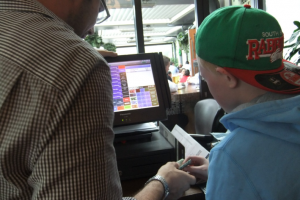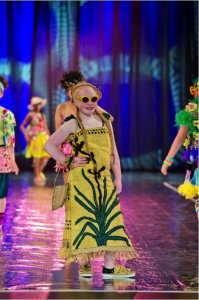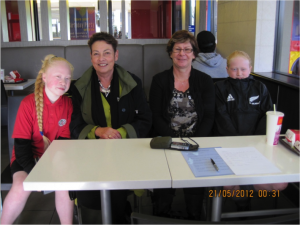Emris and Heaven, two 13 year old Intermediate school students with Albinism, needed further development of their social confidence and social skills.
Their Resource Teachers Vision Viv Nuku and Jacqueline Killip developed a social skills programme based upon research which identifies the positive outcomes of sharing social interactions for students with Albinism.
In figure 1 Emris paying for his restaurant lunch.
Developing social skills
Heaven and Emris are now part of a larger group of 6 Intermediate aged students with Albinism who get together once a term to extend their social skills in a variety of settings and activities.
Within a safe physical and emotional environment each session has included:
- Icebreaker
- Specific Social Skill
- Daily Living Skills
- Physical Activities
- Drama
- Curriculum Activities
- Self-reflection/Evaluation
We have asked students to reflect on their interactions each time and required them to not only rate themselves in terms of; making eye contact, initiating greetings, making cooperative decisions etc. but to think deeply about the impact the group involvement has had on their knowledge of Albinism and its challenges.
- Heaven participated in the Schools Trash to Fashion Show in Year 8 because she had gained more confidence in front of people she did not know. She presented a speech to her class, for the first time in her schooling, about her experience.
- Emris seriously considered applying for a leadership role at school in Year 8 which is something he would not have considered before.
- Using the skills they have been taught they should be more able to cope with the challenges of Secondary School and the number of new adults and students they will be required to interact with on a daily basis
In figure 2 Heaven is modelling her outfit on stage.
Prerequisite skills
In addition to working individually with each of the students in their classrooms, the RTV recognized similar needs for each of the students. Therefore they planned a short, structured outing to a familiar environment, the local McDonalds, where the students could meet each other and the RTV could model and support the appropriate social skills
Skills focused on:
- Greeting an unknown adult/child
- Making eye contact
- Asking an open question of someone they didn’t know and then supplying their own answer to the question.
- Order and pay for their own food
- Verbalise their choices and decisions
During this initial outing Emris pulled his sweatshirt up around his face and looked down constantly. Heaven had never ordered and paid for her own food or used a soft drink machine. They were unable to initiate a conversation with each other but this developed as they used the open questions the RTV had provided them with.
In figure 3 the students and their resource teachers vision are out at lunch.
Possible next steps
- Further outings with increased interactions with other students with Albinism and other RTV.
- Students individually research and present a Power Point about Albinism as it relates to them.
- Students as a group identifying both the challenges and positive aspects of having Albinism
- Students learning to be socially adept in unfamiliar venues.
- Scaffolding social conversations
- Deeper level of self-reflection/evaluation and goal setting.
Teaching methods and strategies
- Modeling and direct teaching of appropriate social interactions- Greetings, questions, compliments, initiating conversations, ordering and purchasing.
- Icebreakers- support initial interactions at the beginning of sessions and conversations within the group
- Focus on paying and receiving compliments
- Co-operative Games and Team Building – board games, problem solving, team challenges, crosswords,
- Problem Solving and Drama Scenarios and Role Play.
- Orientation and Mobility strategies in unfamiliar environments, including map reading, initial familiarization of new environment, arranging a meeting point, identifying entrances and exits and public toilets.
Learning adaptations
- Large Print copies of all handouts, menus and score sheets to enable the students to read easily.
- Orientate to environments-ensure that accidents avoided and students more comfortable being in a new environment.
- Direct demonstrations of activity required- put them at ease and help set the standard that was expected.
- Co-operative activities-inclusion of all group members.
- Pre-visit of all venues by RTV to ensure that any adaptations were put in place and hazards identified for the safety of the learners.
Assessment
- Anecdotal evidence from ORS support and discussion with colleague about how shy and lacking in confidence the 2 students were. Heaven had never experienced ordering, paying for her own meal or using the drink machine at McDonalds.
- Participation by RTV in a Social Skills course by Allison Schroeder.
- Reading online articles about social skills and Albinism
- Student self-reflection sheet after each outing which became increasingly more detailed.
- RTV debriefing meetings and evaluation of the progression of skills and next focus.
- Checklist developed for this group at the end of a 2 year period.
Useful Links
- Information Bulletin: Social Aspects of Albinism – Noah website.
- Social & Emotional Aspects of Albinism – TSBIV website.
- Living with Albinism – PDF (220KB) from Insight Magazine, RNIB website.
- Eyes Right – An introduction to living with Albinism in New Zealand by Allen Little – PDF (877KB).
- Teaching Students with Sensory Impairments: Ssocial Skills by Dolly Bhargava – Word Doc (33KB).
More information
Email us at BLENNZ Online for more information about this subject. We will link you up with either the author of this post or another BLENNZ colleague with whom you can continue your conversation.



